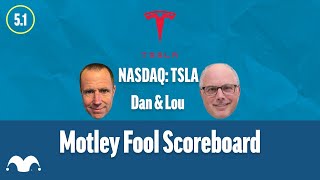Whether you realize it or not, long-term investors were treated to something truly special in 2019. When the curtain closed, the benchmark S&P 500 had increased in value by approximately 32% (including dividends), which is more than four times its historical annual average return of 7%, inclusive of dividend reinvestment and when adjusted for inflation.
Perhaps best of all, many of the most popular publicly held companies galloped higher by a double-digit percentage last year.
But what makes the stock market a true market is variety of opinion. Right now, there's an extremely popular stock that I believe is priced for perfection and is therefore worth avoiding like the plague in 2020.

A Tesla Model S plugged into an electrical outlet. Image source. Tesla.
Tesla Motors has been virtually unstoppable since late May
Since late May, short-sellers in electric vehicle (EV) manufacturer Tesla Motors (TSLA +3.47%) have been steamrolled. Shares of Tesla are up more than 155% over that span, with Tesla recently being crowned the most valuable U.S. automaker.
What's worked, you ask? Aside from the fact that CEO Elon Musk has done what pretty much no other auto visionary has done over the past five-plus decades -- create a successful mass-produced car company -- the recent bullishness is tied to a combination of Tesla opening a production facility in Shanghai, China, the introduction of the Cybertruck, and Tesla surpassing its previously set goal for 2019 Model 3 deliveries.
Until recently, Tesla only had its single production facility in Fremont, California. However, the Shanghai facility, which was built in only 10 months, began commercial production in November and should eventually have the capacity to produce 150,000 Model 3 sedans each year. By the end of 2020, Tesla should be sourcing all of its parts locally, meaning the Shanghai factory's part-supply costs and production efficiency should improve with each passing quarter.
The question is, what price is too much to pay for innovation? My belief is that an $86 billion valuation on Tesla is way too much, which is what makes this stock an easy one to avoid in 2020.

Tesla's vehicle production line. Image source: Daniel Sparks, The Motley Fool.
A laundry list of reasons to shy away from Tesla
For one thing, Tesla is being valued as if it's a fully established automaker, when that's not the case. Since the beginning of 2008, Tesla has delivered 901,461 EVs. To put this into perspective, Toyota Motor and Ford profitably produced the same number of vehicles (albeit predominantly gas-powered) in 2018 that Tesla has produced in its entire lifetime as an automaker in 41 days and 62 days, respectively. Despite continuing to ramp up production, Tesla is more of a start-up than an established car stock, which is what it's currently being valued as.
Another pretty obvious problem is that Tesla isn't profitable, even on a full-year adjusted basis. The company has previously leaned on tax credits to aid its bottom line and needs strong sales from its less-expensive Model 3 to hit recurring profitability. It'll also need to do so from here on out without the EV credit program, which ended in 2019. This isn't to say Tesla can't become profitable on an adjusted basis so much as to point out that it's not there yet, and still has an $86 billion valuation.
Financing continues to be a concern for Tesla and it seems to rear its head every year. Despite $5.3 billion in cash, Tesla is also lugging around $14.6 billion in debt as of the end of the third quarter. In fact, Musk noted last May just how close Tesla was to going belly up. At the time, he suggested that the company's cash (as of the end of Q1 2019) would only sustain operations for 10 months without hardcore changes.
It's worth noting that Tesla ended the September quarter with $7.9 billion in current assets and $9.8 billion in current liabilities, suggesting that near-term financing is still a bit dicey.

Tesla CEO Elon Musk speaking on a stage. Image source: Daniel Sparks, The Motley Fool.
Continuing down the list, Tesla's acquisition of SolarCity for a hefty premium in 2016 looks to have been a complete bust. Solar deployed, in terms of megawatts, declined 54% from the prior-year period in the latest quarter, and without substantially higher crude and/or natural gas prices, I don't see how SolarCity comes anywhere close to being a profitable subsidiary for Tesla.
Next, take note that Tesla has been cutting the price of what it foresees as its breadwinner, the Model 3, in the U.S. and China. Last year, the Model 3 saw multiple price cuts in the U.S., which Tesla correlated with the reduction in EV tax credits. Meanwhile, price cuts are being enacted on Chinese model 3s right as sales commence.
Some might view this action as nothing more than making this bread-and-butter product accessible to more consumers. I view it as a margin-reducing move from a company that's already in a position of financial weakness.
Finally, Musk may be a visionary, but he's terrible when it comes to meeting innovative guidelines. He's attempting to do what no other automaker before him has done and there's no precedent, but as a result, pretty much none of Musk's projects have been anywhere near their projected timelines.
I'd rather own Ford any day of the week and would suggest investors keep their distance from Tesla for the time being.






